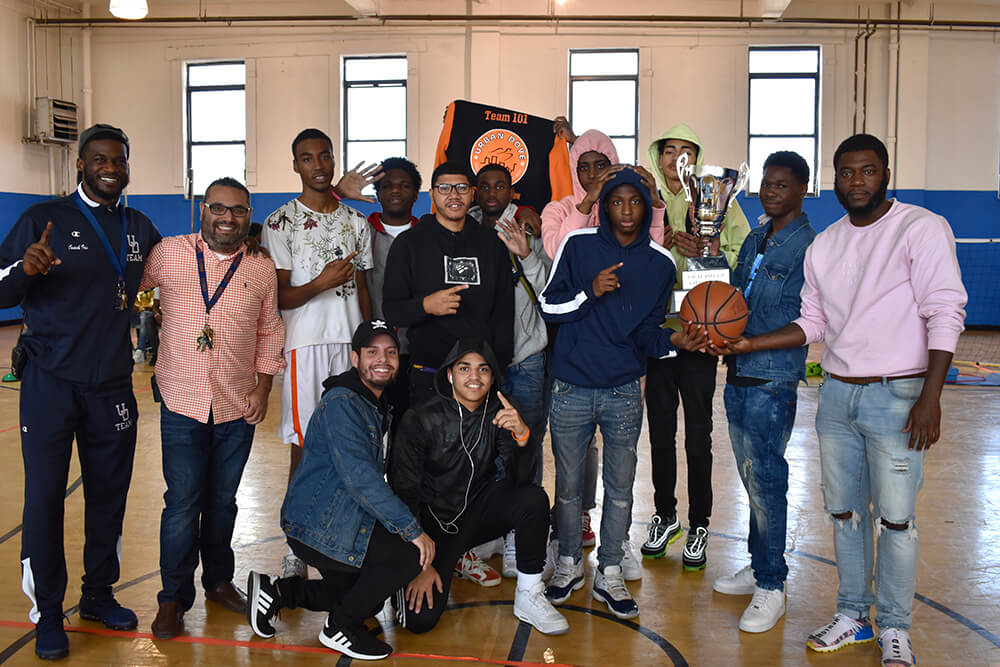Helping At-Risk Youth Graduate
High School Principal Amit Bahl Credits the Touro Graduate School of Education for Helping Him Teach His Students to Soar

If easy is the game plan, steer clear of the School Leadership Program in Touro’s Graduate School of Education (GSE). “It is intense,” says Amit Bahl. “I mean, intense!”
And he loved every minute of the program, which earned him a master’s degree and knowledge that took him from being a social studies teacher to the director of two (soon to be four) transfer high schools in New York City, called Urban Dove. The school’s mission is to use teamwork in sports and academics to transform the lives of more than 600 struggling students.
Fully half of Urban Dove’s students failed ninth grade not once, but twice. “Virtually no school was taking transfer students who were 14, 15 and 16,” he says. “They were on track to drop out. Our kids may work full time, or care for their siblings, or have other social or emotional issues like depression, not to mention poverty, that keep them from attending, much less succeeding, in school.”
Urban Dove’s attendance rate is 65 percent. In contrast, the daily attendance rate in the city’s transfer schools is 50 percent. “If we can get them here three days a week, they will learn, they will flourish, they will graduate,” says Bahl, who began with Urban Dove when it opened in 2012, shortly after he received his master’s degree in school leadership. Now 44, Bahl has been a teacher, an assistant principal and eventually rose to director of the high schools. “All credit,” says Bahl, “goes to Touro.”
It may seem odd in these days of the so-called slacker work ethic, to prize a graduate program that holds students accountable and expects them to excel. But in his years as a professor in the School Leadership Program, Thomas Troisi, a former teacher, principal and superintendent, believes success lies first in choosing the right candidates. “We look for leaders,” says Troisi. “Someone who empowers not only themselves, but other people to reach individual or group goals. They have the discipline and desire to rise in their field.”
The students tend to be in their mid-20s and older, and already hold one master’s degree in education and are willing to work full time for a second. In the program, they learn technical skills such as how to conduct teacher evaluations, school finance, application of education law and more. In the school’s human resources course, for example, students are charged with developing a comprehensive plan for the recruitment and selection of a classroom teacher.
But nothing has had the lasting power—or impact—than the required internships. Not just one, but two internships.
Bahl valued the camaraderie between students and professors, and that he was taught by those with extensive experience in the educational arena. “But the key was the internships—were they demanding! But essential.”
Bahl interned at the school where he was already teaching five social studies classes to more than 100 7th and 11th graders daily. But none of that counted as an internship. So, he ran meetings and sat in on meetings, he took on the role of data analyst and figured out ways to make computer information more relevant and easier to upload, download and digest for relevancy. He learned to supervise others and how to understand the school’s entire budget and curriculum. “I even planned a fundraiser, the annual Christmas party and the graduation ceremony,” he recalls, laughing.
Touro’s two-year program is entirely asynchronous, and the flexibility seems to work well for professors and students. Graduates have gone on to become principals, superintendents, headmasters, department heads of curricula, data, human resources and a myriad of other leadership roles in schools and other educational organizations. “We create all sorts of online get-togethers and seminars, and we go out and visit students where they are interning,” Troisi says. “But we also treat them like the grown-ups they are.”
As Bahl looks back at his time at in the School Leadership Program, he found inspiration through another requirement, the “situation journal.” No matter the day’s demands, students had to write about what stood out to them, what they learned, what challenged or delighted them. “Now my situational journal is in my head every single day,” Bahl says. “It is the framework and foundation for how I do my job.”

